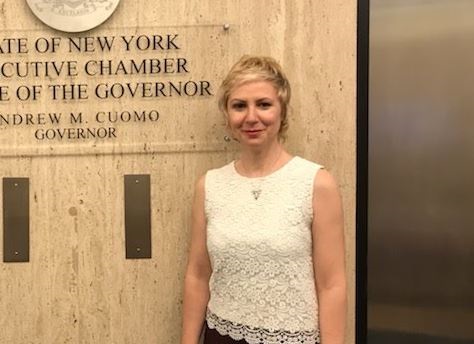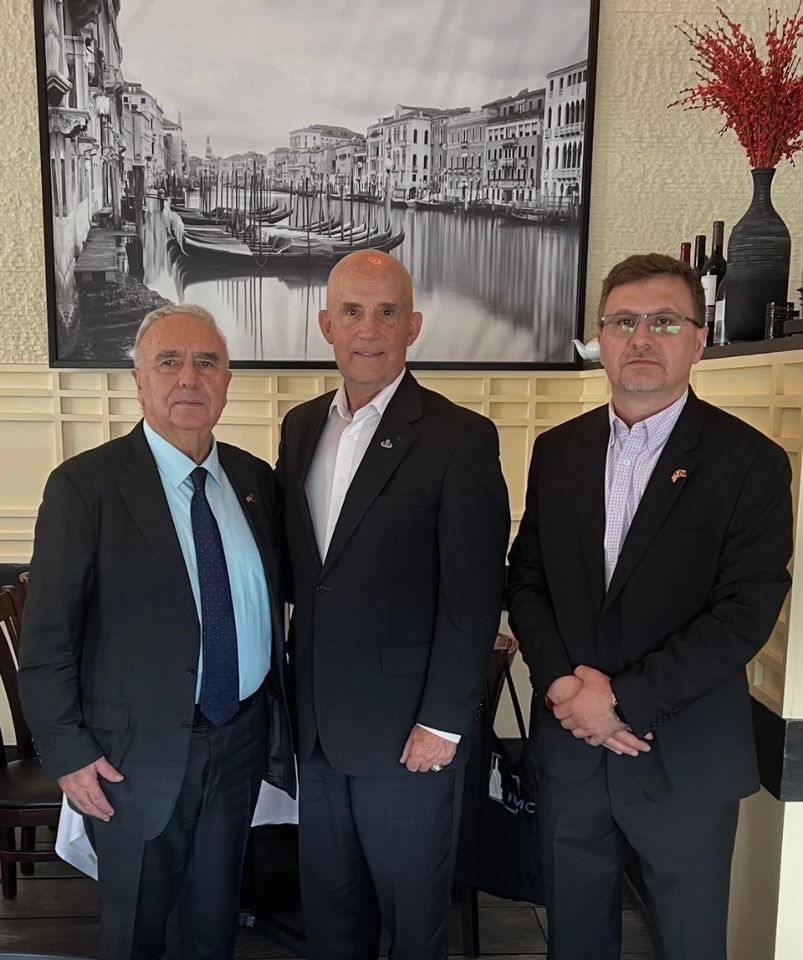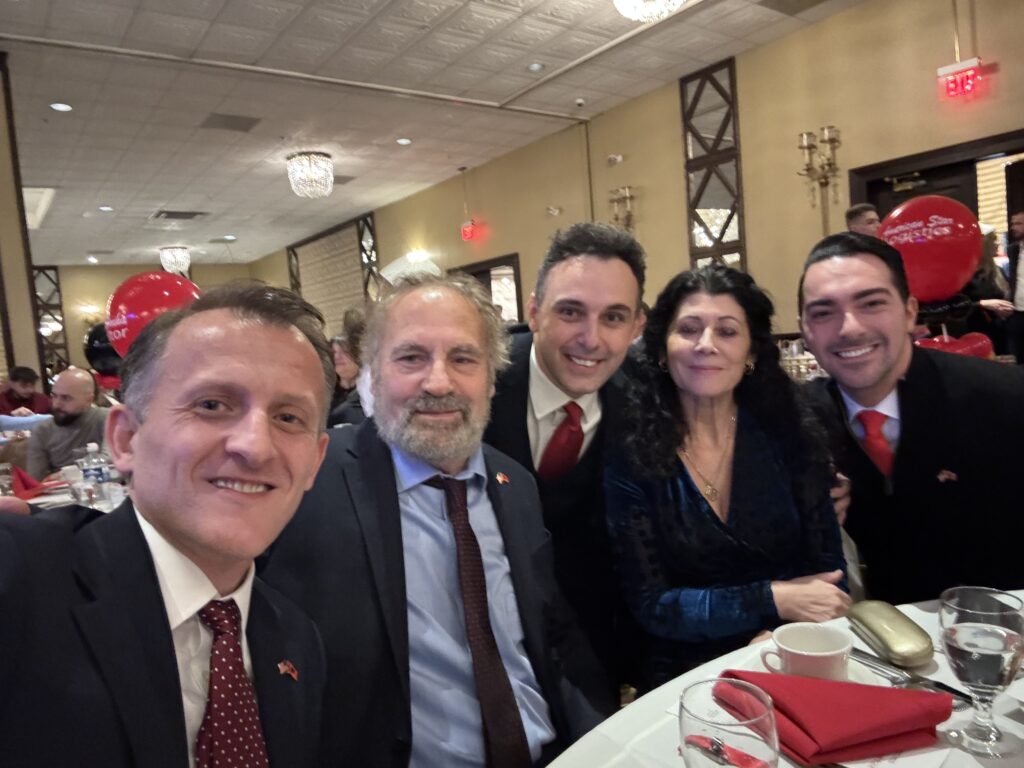International Virtual Conference – Latest Trends in Digital Health By Rafaela Prifti




We awaited, rightfully and with great joy, the day of the Hearing Session on the Western Balkans in the House Foreign Affairs Committee of the U.S. Congress, chaired by the well-known Congressman Keith Self, a friend of the Albanians.
And we were not disappointed. The questions and issues raised by the congressmen and the answers given by the witnesses—whenever Kosova was the subject—were almost entirely in Kosova’s favor. Serbia was in the seat of the accused for all its destructive and destabilizing policies in the Balkans.
Among the most important points was the harsh criticism directed at Serbia for the systematic violation of the human rights of the Albanian population living in the ancestral regions of Preseva, Bujanoc, and Medvegja. Everyone present agreed on this point, and Congressman Self even presented a congressional resolution which may be considered historical.
The danger posed by Russian-Serbian hegemonism was emphasized, with a request that the Trump Administration engage more to preserve peace in the Western Balkans.
America has invested greatly in Kosova since 1999. This investment must be protected, maintained, and further developed. Since Europe, for many reasons, lacks the capacity to restrain Serbian aggression, it is essential that America be directly and decisively involved in the Balkans. The conflict between Kosova and Serbia can only be solved through American intervention.
Mr. Edward Joseph’s proposal for Kosova’s membership in NATO is the quickest solution to the problem with Serbia, because it extinguishes Serbian hopes for border changes and for returning to the place where it committed its crimes.
American engagement is always good news for Kosova, provided that one works hard with American officials—discussing calmly, with arguments, and with respect.
All this good news for Kosova was attempted to be belittled, distorted, and misused for personal, clan-based, and party interests by some representatives of Kosova’s opposition parties, together with their analysts and journalists from all sides, sold to the enemies of the Albanian people.
In the style of “oh men, the Bistrica river is on fire,” they fixated only on 15 seconds of this extraordinary session—more than four hours long—in which, during one of Congressman Self’s short routine questions about whether PM Albin Kurti is considered “an obstructionist” by some career bureaucrats in the State Department, two panelists answered yes, and the third mostly yes.
In many media, especially social media, sensational and disgracefully low-level headlines against Kurti exploded, with fantastical, illusory predictions about the “end” of his political career. The “blocker, obstacle” chorus began, along with the dance of his opponents and the enemies of Kosova. The internet nearly exploded. The day after the hearing was a circus day—it would have been funny if it weren’t shameful.
Where were these clowns three years ago when, in a Senate hearing, Senator Menendez asked senior State Department official Derek Chollet whether President Vučić had ties to organized crime, and he answered Yes?! Imagine if this had been said about Mr. Kurti—there would have been the end of the world.
It is well known that various career bureaucrats in the State Department may have differing opinions on certain issues, which they can change as needed.
During my 35 years of lobbying activity in Washington within the Albanian American Civic League, with national legends Joseph DioGuardi and Shirley Cloyes DioGuardi, we often were confronted with high-level U.S. officials influenced by Serbia, including former Secretary of State Lawrence Eagleburger.
Some of them called former Congressman DioGuardi a “troublemaker”. Such people were calmed by the U.S. Congress after the wise actions of the AACL and pressure by the Albanian-American community.
It must be emphasized that there are serious indications that the coordinator of many actions against Kosova and American interests in the Balkans—within certain American circles as well as within the Kosova opposition—is the former U.S. Ambassador Richard Grenell, influenced by Aleksandar Vučić’s fascist regime.
He is a sworn opponent of PM Albin Kurti, an open destroyer of Kosova’s democracy in 2020, a direct interferer in the free parliamentary elections of February 2025, and an adviser to Kosova’s opposition on how to block Kosova’s institutions and make political chaos, with the goal of removing Kurti from politics.
It is widely believed that he is also behind Bedri Hamza’s sudden and surprising trip to Washington—without any logic or need—just to boost the opposition’s chances and weaken Kurti before the elections. This is an anti-democratic act with the aim of interfering in the free elections of one country for the interests of another enemy country.
As former Ambassador Grenell’s public statements became noticeably pro-Serbian, he has begun to change his strategy, asking other American officials to come out publicly against Kosova and Prime Minister Kurti, including the American Embassy in Prishtina.
He is trying to empower the hostile organization “Lista Srpska” and facilitate Serbia’s return to Kosova, camouflaged by supposed economic relations.
The well-known Republican Congressman Mike Lawler recently told us in a meeting with the Albanian-American community, that Grenell presents himself as more important than he actually is within the Trump Administration. Furthermore, by supporting Serbian aggression, he seeks conflict in the Balkans, while President Trump is against conflicts and wars. For this reason Grenell’s time is on the decline.
Former Ambassador Christopher Hill, who has become Serbia’s lobbyist in Washington, is acting in the same way. He is criticizing Kosova and Prime Minister Kurti without any basis. Grenell and Hill do not represent official U.S. policy— they represent Serbian interests in America.
I hope that the people of Kosova will give their answer with their vote—by a majority for PM Albin Kurti on December 28, and at the appropriate time, for President Osmani. Only the people of Kosova can save Kosova from Serbia’s return, for a secure pro-European and pro-American future.
American support will not be lacking. In the end, America prefers strong and uncorrupted leaders like Vjosa Osmani, Albin Kurti, and Glauk Konjufca.
Kosova is with America and America is in Kosova. Serbia is with Russia and Russia is in Serbia. This will never change.
• Kosova është me Amerikën dhe Amerika është në Kosovë.


E pritëm, me të drejtë me gëzim të madh, ditën e Seancës Dëgjimore për Ballkanin Perëndimor në Komitetin për Punë të Jashtme të Dhomës së Përfaqësuesve të Kongresit të SHBA-së, të kryesuar nga kongresisti i njohur Keith Self, mik i shqiptarëve.
Dhe nuk u zhgënjyem. Pyetjet dhe çështjet e ngritura nga kongresistët dhe përgjigjet e dhëna nga dëshmitarët—sa herë që bëhej fjalë për Kosovën—ishin pothuajse të gjitha në favor të Kosovës. Serbia ishte në bankën e të akuzuarve për të gjitha politikat e saj shkatërruese dhe destabilizuese në Ballkan.
Ndër pikat më të rëndësishme ishte kritika e ashpër drejtuar Serbisë për shkeljet sistematike të të drejtave të njeriut të popullsisë shqiptare që jeton në trojet autoktone të Preshevës, Bujanocit dhe Medvegjës. Të gjithë të pranishmit u pajtuan për këtë pikë, dhe kongresisti Self madje paraqiti një rezolutë kongresionale e cila mund të konsiderohet historike.
U theksua rreziku që paraqet hegjemonia ruso-serbe, me kërkesën që Administrata Trump të angazhohet më shumë për ruajtjen e paqes në Ballkanin Perëndimor.
Amerika ka investuar shumë në Kosovë që nga viti 1999. Ky investim duhet mbrojtur, ruajtur dhe zhvilluar më tej. Meqenëse Evropa, për shumë arsye, nuk ka kapacitetin për të frenuar agresionin serb, është thelbësore që Amerika të jetë e përfshirë drejtpërdrejt dhe vendosmërisht në Ballkan. Konflikti ndërmjet Kosovës dhe Serbisë mund të zgjidhet vetëm përmes ndërhyrjes amerikane.
Propozimi i z. Edward Joseph për anëtarësimin e Kosovës në NATO është zgjidhja më e shpejtë e problemit me Serbinë, sepse shuan shpresat serbe për ndryshim kufijsh dhe për t’u kthyer në vendin ku ka kryer krimet e saj.
Angazhimi amerikan është gjithmonë lajm i mirë për Kosovën, me kusht që të punohet shumë me zyrtarët amerikanë—duke biseduar qetë, me argumente dhe me respekt.
Krejt këto lajme të mira për Kosovën u përpoqën t’i zvogëlonin, t’i shtrembëronin dhe t’i keqpërdornin për interesa personale, klanore dhe partiake disa përfaqësues të partive opozitare të Kosovës, bashkë me analistët dhe gazetarët e tyre nga të gjitha anët, të shitur te armiqtë e popullit shqiptar.
Në stilin “o mulni burra, se u kall Bistrica”, ata u fiksuan vetëm pas 15 sekondave të këtij sesioni të jashtëzakonshëm—më shumë se katër orësh—në të cilin, gjatë një prej pyetjeve të shkurtra rutinë të kongresistit Self rreth asaj nëse disa burokratë të karrierës në Departamentin e Shtetit e konsiderojnë Kryeministrin Albin Kurti si “obstruksionist”, dy panelistë u përgjigjën po, dhe i treti kryesisht po.
Në shumë media, sidomos në rrjetet sociale, shpërthyen tituj sensacionalë dhe të turpshëm kundër Kurtit, me parashikime fantastike e iluzore për “fundin” e karrierës së tij politike. Filloi kori i “penguesi, bllokuesi”, së bashku me vallen e kundërshtarëve të tij dhe armiqve të Kosovës. Gati sa nuk eksplodoi interneti. Dita pas dëgjimit ishte ditë cirku—do të ishte qesharake, po të mos ishte e turpshme.
Ku ishin këta kllounë tre vjet më parë, kur në një seancë të Senatit, senatori Menendez e pyeti zyrtarin e lartë të Departamentit të Shtetit Derek Chollet nëse presidenti Vuçiç kishte lidhje me krimin e organizuar, dhe ai u përgjigj Po?! Merreni me mend sikur kjo të ishte thënë për z. Kurti—do të ishte bërë kiameti.
Dihet mirë se burokratë të ndryshëm të karrierës në Departamentin e Shtetit mund të kenë mendime të ndryshme për çështje të caktuara, dhe t’i ndryshojnë ato sipas nevojës.
Gjatë 35 viteve të mia të veprimtarisë lobuese në Washington brenda Ligës Qytetare Shqiptaro-Amerikane, me legjendat kombëtare Joseph DioGuardi dhe Shirley Cloyes DioGuardi, shpesh jemi ballafaquar me zyrtarë të lartë amerikanë të ndikuar nga Serbia, përfshirë edhe ish-Sekretarin e Shtetit Lawrence Eagleburger.
Disa prej tyre e quanin ish-kongresistin DioGuardi “ngatërrestar”. Të tillët qetësoheshin nga Kongresi Amerikan pas veprimeve të mençura të LQSHA-së dhe presionit nga komuniteti shqiptaro-amerikan.
Duhet theksuar se ka indikacione serioze se koordinatori i shumë veprimeve kundër Kosovës dhe interesave amerikane në Ballkan—brenda disa qarqeve amerikane dhe brenda opozitës së Kosovës—është ish-ambasadori amerikan Richard Grenell, i ndikuar nga regjimi fashist i Aleksandar Vuçiqit.
Ai është kundërshtar i përbetuar i Kryeministrit Albin Kurti, shkatërrues i hapur i demokracisë së Kosovës në vitin 2020, ndërhyrës i drejtpërdrejtë në zgjedhjet e lira parlamentare të shkurtit 2025, dhe këshilltar i opozitës së Kosovës për mënyrën se si të bllokohen institucionet e Kosovës dhe të krijohet kaos politik, me qëllim të largimit të Kurtit nga politika.
Besohet gjerësisht se ai qëndron edhe pas udhëtimit të shpejtë dhe të habitshëm të Bedri Hamzës në Washington—pa asnjë logjikë apo nevojë— vetëm për të rritur shanset e opozitës dhe për të dobësuar Kurtin para zgjedhjeve. Ky është një veprim antidemokratik me qëllim të ndërhyrjes në zgjedhjet e lira të një shteti për interesa të një shteti tjetër armik.
Meqë deklaratat publike të ish-Ambasadorit Grenell u bënë dukshëm pro-serbe, ai ka filluar të ndryshojë strategjinë e tij, duke i nxitur zyrtarë të tjerë amerikanë të dalin publikisht kundër Kosovës dhe Kryeministrit Kurti, përfshirë Ambasadën Amerikane në Prishtinë.
Ai po përpiqet të fuqizojë organizatën armiqësore “Lista Serbe” dhe të lehtësojë rikthimin e Serbisë në Kosovë, të maskuar me marrëdhënie të supozuara ekonomike.
Kongresisti i njohur republikan Mike Lawler na tha së fundmi, në një takim me komunitetin shqiptaro-amerikan, se Grenell paraqitet si më i rëndësishëm sesa është në të vërtetë brenda Administratës Trump. Për më tepër, duke mbështetur agresionin serb, ai kërkon konflikt në Ballkan, ndërsa Presidenti Trump është kundër konflikteve dhe luftërave. Për këtë arsye koha e Grenellit është në kalim e sipër.
Ish-ambasadori Christopher Hill, i cili është bërë lobist i Serbisë në Washington, po vepron në të njëjtën mënyrë. Ai po kritikon Kosovën dhe Kryeministrin Kurti pa asnjë bazë. Grenell dhe Hill nuk përfaqësojnë politikën zyrtare të SHBA-së—ata përfaqësojnë interesat serbe në Amerikë.
Shpresoj që populli i Kosovës të japë përgjigjen e tij me votë—me shumicë për Kryeministrin Albin Kurti më 28 dhjetor, dhe në kohën e duhur, për Presidenten Osmani. Vetëm populli i Kosovës mund ta shpëtojë Kosovën nga rikthimi i Serbisë, për një të ardhme të sigurt pro-evropiane dhe pro-amerikane.
Mbështetja amerikane nuk do të mungojë. Në fund, Amerika preferon liderë të fortë dhe të pakorruptuar si Vjosa Osmani, Albin Kurti dhe Glauk Konjufca.
Kosova është me Amerikën dhe Amerika është në Kosovë. Serbia është me Rusinë dhe Rusia është në Serbi. Kjo nuk do të ndryshojë kurrë.
Suzanna Shkreli është një tjetër shqiptaro-amerikane që po hyn në garë politike. Demokratja e njohur po synon postin e Sekretarit të Shtetit në Michigan.
Kjo është një pozitë shumë e rëndësishme administrative e shtetit që mbikqyr veç të tjerash zgjedhjet presidenciale. Duke qenë se Michigan është një nga 8 apo 10 shtetet vendimtare në zgjedhjen e presidentit, të dy partitë do të bëjnë çmos që të kapin postin e Sekretarit të Shtetit. Sidomos tani që ka një rritje drastike të mosbesimit në procesin zgjedhor nga të dy partitë.
“Unë besoj vërtet se demokracia amerikane është në rrezik”, tha ajo për një nga gazetat lokale, duke folur për kandidaturën e saj.
Deri dje, Shkreli ishte Komisionerja e Shtetit për Llotarinë në Michigan. Më parë ka qenë një ndihmës-prokurore e suksesshme si dhe Drejtore e Zyrës së Ombudsmanit të fëmijëve. Ajo është edhe bashkëthemeluese dhe anëtare e Bordit të Drejtorëve të Demokratëve Shqiptaro-Amerikanë.
Shqiptarët mësuan për herë të parë për Suzanna Shkrelin në vitin 2016, kur u bë kandidatja më e re që synoi Kongresin Amerikan, në moshën 29-vjeçare. Ndonëse mundësitë e saj ishin të pakta, për shkak se hyri në garë vonë, për të ndihmuar Partinë Demokrate në Distriktin 8 në Michigan. Ajo humbi përballë kongresistit Mike Bishop.
Lexuesit nuk duhet të ngatërrojnë postin e Sekretarit të Shtetit, në kabinetin e presidentit, që është praktikisht ministri i jashtëm amerikan, me postin me të njëjtin emër të çdo shteti. i pari është diplomatik, i dyti administrativ.
Suzanna Shkreli do të duhet të fitojë garën brenda Partisë Demokrate ku përballet me dy kandidatë të tjerë. Fituesi do të garojë me kandidatin e Partisë Republikane ku gjithashtu kandidojnë tre vetë.
Demokratja Shkreli ashtu si Republikani Robert Lulgjuraj, janë pjesë e të njëjtit komunitet shqiptarësh në Michigan. Larmia politike e këtij komuniteti refleton atë të shtetit ku jetojnë. Jo më kot, shqiptarët në Michigan gëzojnë vëmendjen e të dy partive kryesore amerikane. Fati i vendit caktohet aty çdo katër vjet.
Suksese shqiptaro-amerikanëve, pavarësisht se çfarë partie i përkasin! Suksese Suzanna!

Ja pse Robert Lulgjuraj ka shansin të shkruajë historinë dhe pse fitorja e tij do të silte një shans të rrallë për përpjekjet shqiptare në Washington
Shqiptarët në New York dhe Connecticut do të kenë të dielën më 7 dhjetor, shansin për të njohur nga afër dhe për të ndihmuar financiarisht kandidatin për Kongresin Amerikan, Robert Lulgjuraj.
Dy takime janë parashikuar me të: i pari në Restorantin “Club A Steakhouse”, në Manhattan, 2:00 PM, në Manhattan dhe pastaj në “Townhouse”, 35 Church Street, Greenwich, Connecticut, në 6:00 PM.
Nëse zgjidhet, Lulgjuraj do të bëhet shqiptaro-amerikani i parë në histori, me prindër emigrantë shqiptarë nga Ballkani, që do të bëhet kongresist, anëtar i Dhomës së Përfaqësuesve në Washington.
I ri në moshë, dinamik, me një karrierë të sigurtë përpara në fushën e ligjit (që tani ka vënë emër si ndihmës prokuror në Michigan), Lulgjuraj po provon fatin në politikë në Distriktin 10 të shtetit Michigan.
Që të arrijë këtë fitore historike, ai duhet të kalojë dy sfida të mëdha. E para të fitojë brenda një grushti kandidatësh republikanë që synojnë shansin për të konkurruar në nëntor 2026 dhe e dyta të fitojë betejën përballë kandidatit të Partisë Demokrate.
Lulgjuraj ka dy arsye të forta që të jetë optimist:
E para, mes kandidatëve republikanë është treguar më i suksesshmi në mbledhjen e fondeve. Njerëzit po tregojnë se kanë besim te fitorja e tij dhe kanë “votuar” me portofolet e tyre. Akush nuk do që të hedhë para për kauza që nuk shkojnë kund. Paraja nuk është gjithshka në politikë, por është një tregues i rëndësishëm.
E dyta, republikanët kanë fituar rregullisht në këtë zonë gjatë viteve të fundit.
Por mbetet ende shumë për të bërë. Një kandidat i ri republikan ka hyrë në garë dhe të tjerët do të mundohen ta ngushtojnë diferencën financiare. Nga ana tjetër, ky është një nga distriktet ku të dy partitë kanë mundësi fitoreje. Demokratët kanë shpresë që viti 2026 do të jetë një vit revanshi politik dhe Distrikti 10 në Michigan është rregullisht në listën e distrikteve ku mund të ndodhin përmbysje politike.
Më 2022, republikani afrikano-amerikan John E. James u zgjodh kongresist nga Distrikti 10 duke fituar 48.8% me 48.3%, pra vetëm me 0.5% diferencë nga rivali demokrat. Më 2024, doli më mirë, por tani po largohet për të kandiduar për Guvernator të shtetit Michigan. Kjo ka lënë bosh karrigen e kongresistit dhe të dy partitë duan ta fitojnë me çdo kusht. Dhoma e Përfaqësuesve ka 219 republikanë dhe 212 demokratë. Një grusht distriktesh mund të përmbysin pushtetin legjislativ.
Lulgjuraj ka nevojë për ndihmën e bashkatdhetarëve tanë tani. Ka nevojë për garën brenda Partisë Republikane. Sepse nëse fiton aty, mbështetja për të, në vjeshtën e 2026 do të jetë masive. Duke filluar nga vetë Presidenti Donald Trump. Sepse pak do të jenë distriktet ku do të përleshen të dy partitë. Ky është një nga ata.
Kur Kongresisti James vendosi të kandidojë për guvernator, vetë Presidenti Trump reagoi. “Je i sigurtë”, i tha “që kemi dikë që të të zëvendësojë aty?” Ka më shumë se 400 distrikte të Dhomës. Presidenti mban mend ato që janë më të rrezikuarat. Nëse republikani Lulgjuraj fiton, ai do të ketë një linjë direkte me Shtëpinë e Bardhë. Nuk do të kemi vetëm shqiptarin e parë në Kongres. Do të kemi edhe një mundësi të vyer lobimi që vjen rrallë.
Distrikti 10 në Michigan është një nga distriktet me më shumë shqiptarë në Shtetet e Bashkuara. Vota e tyre mund të luajë një rol të madh. Mirëpo, deri sa të shkohet te vota, fushata e kandidatit Lulgjuraj do të ketë nevojë për muskuj financiarë.
Sot keni mundësinë që të ndihmoni një djalë të ri që vërtet do t’i shërbente shumë mirë të gjithë distriktit nëse do të shkonte si kongresist në Washington, si dhe do të shënonte një rekord historik për komunitetit shqiptar në SHBA. Një patriot i vërtetë zgjedhja e tij do të ishte një fitore për vetë Amerikën.

4 Dhjetor 2025
Fjalimi i Shirley Cloyes DioGuardi-t në Ditën e Pavarësisë në Çikago
I dashuri mik dhe përkrahës,
Joe DioGuardi dhe unë e vlerësuam thellësisht vendimin e Edon Shaqirit dhe Taip Beshirit, udhëheqësve të Komunitetit Shqiptaro-Amerikan të Illinoisit, që të na presin për të festuar Ditën e Pavarësisë së Shqipërisë në Çikago më 28 nëntor dhe për t’i njohur publikisht arritjet tona që nga themelimi i Ligës Qytetare nga Joe pasi ai u largua nga Kongresi në vitin 1989, dhe që kur unë u bashkova në vitin 1994 si ish-botuese librash ku kam botuar një nga librat e parë mbi rënien e Jugosllavisë.
Bashkëngjitur është fjalimi që mbajta më 29 nëntor para shqiptaro-amerikanëve që morën pjesë në një aktivitet të nënshkrimit të librave për librin “Përpjekja për lirinë e shqiptarëve dhe fundi i Jugosllavisë: I Nderuari Joseph J. DioGuardi dhe LQSHA 1985-1993, Një përzgjedhje dokumentesh historike, Prezantuar dhe redaktuar nga Faton Bislimi”:
Kam nderin dhe privilegjin që sonte të jem me ju, dhe përsëri dëshiroj të njoh rolin që Edon Shaqiri dhe Taipi Beshiri, udhëheqësit e Komunitetit Shqiptaro-Amerikan të Illinois, kanë luajtur në realizimin e kësaj mbrëmjeje.
Ky është potenciali që të jetë një moment historik, dhe duke na u bashkuar në Çikago, ju mund të bëheni pjesë e tij, sepse ka ardhur koha për ri-afirmimin e rolit unik që shqiptarët kanë luajtur duke jetuar krah për krah në harmoni për shekuj me radhë në Shqipëri, Kosovë, Maqedoni, Mal të Zi, Luginën e Preshevës (Serbia jugore) dhe Çamëri (Greqia veriore). Siç thashë mbrëmë, ne jemi në rrezik ta humbasim këtë realitet unik dhe duhet ta ri-përqafojmë atë.
Sikurse e dini, unë nuk kam lindur shqiptare, por dua që të dini se si e takova Joe DioGuardin dhe si arrita ta përqafoj kauzën kombëtare shqiptare. Unë kam lindur në Shtetet e Bashkuara nga një babë, familja e
të cilit erdhi nga Anglia në koloninë e parë amerikane në vitin 1644 dhe nga një nënë, stërgjyshërit e së cilës erdhën nga Anglia, Skocia dhe Gjermania në shekullin e 19-të.
Faktori kryesor në fëmijërinë time që do të ndikonte në të ardhmen time ishte arrestimi dhe gjyqi i Adolf Eichmann, udhëheqësit nazist i cili menaxhoi dëbimin e gjashtë milionë hebrenjve në kampet e shfarosjes
gjatë Luftës së Dytë Botërore. Isha dhjetë vjeç kur pashë fotografi në faqen e parë të The New York Times të furrave në Auschwitz që hidhnin kufomat e hebrenjve pasi ata ishin vrarë me gaz. I pyeta prindërit e mi se si mund të kishte ndodhur kjo. U preka thellësisht dhe realiteti i Holokaustit nazist do të drejtonte zgjedhjet e jetës sime.
Pasi e mora diplomën Bachelor të Arteve nga Kolegji Oberlin dhe një diplomë Master të Teologjisë në teologji sistematike dhe kulturë nga Unioni Seminarin Teologjik, fillova karrierën time në botimin e librave. Menjëherë pasi u bëra botuese e Lawrence Hill Books, të specializuar në politikën amerikane dhe ndërkombëtare, diktatori serb Sllobodan Millosheviq u ngrit në pushtet. Në qershor të vitit 1989, Millosheviqi katapultoi vëmendjen ndërkombëtare kur mbajti një fjalim në fushën e “Zogjve të Zinj”, duke shënuar 600-vjetorin e Betejës së Kosovës që ishte zhvilluar në këtë vend në vitin 1389 dhe duke paralajmëruar qëllimin e tij për të pushtuar Kosovën. Vetëm për shkak të përpjekjeve të Joe DioGuardit dhe Ligës Qytetare Shqiptaro-Amerikane, ai u devijua për pushtimet e tjera në Ballkan, së pari në Slloveni, pastaj në Kroaci, duke e çuar luftën në Bosnjë në vitin 1993.
Në fund të vitit 1991, e dija se duhej të ndërmerrja veprime. Brezi i gjyshërve të mi nuk kishte arritur t’i ndalte nazistët. E dija se brezi im duhej ta ndalte Millosheviqin, Hitlerin e ri. Si pasojë, fillova punën në një libër të ri, një antologji të titulluar “Makthi Etnik i Jugosllavisë”, me kapituj të kontribuar nga anëtarë të opozitës së Millosheviqit brenda ish-Jugosllavisë, shumica e të cilëve duhej të përktheheshin në anglisht.
Gjithashtu kuptova se përfundimisht do të lija botimin për të luajtur një rol në qeverinë amerikane. Dhe kështu, unë dhe Joe patëm fatin të takoheshim në fund të vitit 1993, kur një nga autorët e mi (një amerikan që
po përgatitej të shkruante një libër për Kosovën) e ftoi atë në një hotel në Manhattan dhe mua një orë më vonë. Por Joe doli të ishte një orë me vonesë. Ne filluam të flisnim dhe pjesa tjetër është histori. Për tridhjetë vjet,
ne nuk kemi pushuar së foluri dhe së punuari për të zgjidhur çështjen kombëtare shqiptare në kohën tonë.
Vazhdova të punoj me Ligën Qytetare Shqiptaro-Amerikane dhe të kontribuoj në disa pika vendimtare të kthesës. E para ishte në vitin 1998, kur punova me Partinë Radikale Trans-nacionale në Itali, të udhëhequr nga
anëtarja e Parlamentit Evropian Emma Bonino, për të sjellë diktatorin serb Sllobodan Millosheviq në Hagë. Në mars të atij viti, parandalova kriminalizimin e UÇK-së (Ushtrisë Çlirimtare të Kosovës) duke i informuar
anëtarët e Kongresit Amerikan se duhej të përballeshin me të dërguarin amerikan për Ballkanin, Robert Gelbard, i cili i kishte dhënë Millosheviqit dritën e gjelbër për të pushtuar Drenicën dhe për të masakruar shqiptarët e Kosovës duke e përshkruar në mënyrë të rreme UÇK-në si një organizatë “terroriste”. Gelbard u detyrua në një seancë dëgjimore të Komitetit të Marrëdhënieve Ndërkombëtare të Dhomës së Përfaqësuesve të tërhiqte deklaratën e tij, dhe brenda natës përpjekja për të kriminalizuar UÇK-në në shtypin perëndimor u ndal dhe armët vërshuan në Kosovë në mbrojtje tëpopullit shqiptar.
Në vitin 2003, unë shkrova legjislacionin në mbështetje të pavarësisë së Kosovës. Pse u deshën pesë vjet për t’u miratuar? Ky ishte rezultat i refuzimit të vazhdueshëm të Departamentit të Shtetit të SHBA-së për ta
çliruar Kosovën nga gjenocidi serb, duke i bërë thirrje Kosovës të përmbushë “standardet” përpara se të njihet “statusi” përpara se të njihej pavarësia dhe duke këmbëngulur që të heshtnim për pavarësinë e
Kosovës. Unë bëra thirrje për fillimin e një fushate ndërkombëtare, të quajtur “Thyerja e Heshtjes”, e cila u zhvillua në Kosovë nga Faton Bislimi, i cili është këtu në audiencë sonte. Një milion nënshkrime në mbështetje të pavarësisë së Kosovës iu dorëzuan Kongresit të SHBA-së në vitin 2004.
Në vitin 2005, dëshmova në një seancë dëgjimore në Kongres me Peshkopin Katolik të Kosovës, Mark Sopi, dhe biografin e autorizuar të Nënë Terezës, Dom Lush Gjergji, që do të shënonte pikën e kthesës në të
ardhmen e Kosovës. Kur Peshkopi Sopi tha duke u përgjigjur pyetjes së kongresistit Dana Rohrabacher se 200,000 shqiptarë katolikë nuk kishin frikë për sigurinë e tyre duke jetuar në një vend me shumicë laike
myslimane, përpjekjet serbe për të bllokuar mbështetjen e qeverisë amerikane për pavarësinë e Kosovës u ndalën. Megjithatë, do të duheshin edhe tre vjet të tjera që qeveria amerikane ta njihte zyrtarisht pavarësinë e
Kosovës, më 17 shkurt 2008. Dhe, tragjikisht, do të rezultonte të ishte pavarësi vetëm në emër, sepse pesë vende të Bashkimit Evropian refuzuan ta njihnin Kosovën si të pavarur nga Serbia deri më sot.
Tani dua të komentoj se ku ndodhen shqiptarët sot. Gjatë luftës së Kosovës, shqiptarët kudo u bashkuan dhe e gjithë bota perëndimore u ngrit në mbështetje të Kosovës dhe shqiptarëve përballë gjenocidit serb. Por jo
shumë kohë pas luftës, dhe veçanërisht pasi Millosheviqi u dorëzua në Gjykatën e Krimeve të Luftës në Hagë në vitin 2001, bota shqiptare filloi të fraksionohej. Shqiptarët filluan të identifikoheshin vetëm me vendin e
origjinës, qytetin, fshatin, familjen, partinë politike dhe udhëheqësit politikë individualë.
Në të njëjtën kohë, dhe sikur që e dini, Beogradi nisi fushatën më të madhe të propagandës antishqiptare ndonjëherë, dhe u krijua një barazi e rreme në skenën botërore midis terrorizmit të sponsorizuar nga shteti i Serbisë kundër kosovarëve dhe Ushtrisë Çlirimtare të Kosovës. Beogradi arriti të ketë sukses sepse Perëndimi dështoi të këmbëngulte që Serbia të de-nazifikohej dhe gjithashtu dështoi t’i jepte Kosovës pavarësinë dhe
integrimin e saj në Ballkanin Perëndimor dhe në Bashkimin Evropian. Në qendër të fushatës së Serbisë ishte përshkrimi i shqiptarëve si një forcë terroriste myslimane, potencialisht fundamentaliste në zemër të Evropës.
Kjo është arsyeja pse Joe, unë dhe anëtarët e Bordit të Drejtorëve të Ligës Qytetare Shqiptaro-Amerikane kemi punuar për shumë vite për të treguar të vërtetën rreth historisë dhe kulturës së botës shqiptare – për të zbuluar, siç bëra në fjalimin tim para Kombeve të Bashkuara në vitin 2014, se shqiptarët janë katolikë romakë, të krishterë ortodoksë, myslimanë laikë dhe hebrenj që jetojnë krah për krah në harmoni për shekuj me radhë dhe se shqiptarët janë forca më pro-perëndimore dhe pro-amerikane në Evropë dhe në botë.
Për këtë arsye, unë besoj se është përgjegjësia dhe detyrimi ynë të bëjmë atë që motrat dhe vëllezërit tanë në Ballkan nuk janë në gjendje ta bëjnë.
Në Shtetet e Bashkuara, mund të jesh shqiptar dhe amerikan. Mund të flasësh shqip dhe anglisht, dhe çdo gjuhë tjetër, për këtë çështje. Në Shtetet e Bashkuara, mund të valëvitësh flamurin amerikan dhe flamurin
shqiptar në privatësinë e shtëpisë tënde ose në publik. Në Amerikë, mund të shprehësh pikëpamjet e tua politike pa frikë. Mund të debatosh realitetet e shqiptarëve në Ballkan. Dhe mund t’i bësh të gjitha këto pa frikën e
arrestimit, torturës, burgosjes, dëbimit dhe gjenocidit – realiteti me të cilin janë përballur shqiptarët në Ballkanin Perëndimor për 150 vitet e fundit dhe me të cilin disa shqiptarë ende përballen në një pjesë të Evropës
Juglindore sot.
Kjo është arsyeja pse unë besoj se është përgjegjësia dhe detyrimi ynë t’u drejtohemi amerikanëve dhe evropianëve që nuk janë shqiptarë për t’iu ndihmuar atyre që të kuptojnë se ajo që po ndodh në Ballkan do të ndikojë në atë që po ndodh në Evropë dhe Amerikë, dhe për këtë arsye të njohim rëndësinë e asaj që tha senatori i atëhershëm Joe Biden në një aktivitet të Ligës Qytetare Shqiptaro-Amerikane në vitin 2002: “Se derisa të pranojmë dhe mbrojmë legjitimitetin etnik të shqiptarëve në Ballkan, të gjitha pjesët e rajonit do të shkatërrohen dhe Perëndimi do ta paguajë shtrenjtë.”
Por sot sfida nuk po vjen nga amerikanët jo-shqiptarë; po vjen nga shqiptarët e Kosovës. Ashtu siç po largohet rryma nga mbështetja evropiane për qeverinë e Serbisë dhe po kthehet drejt njohjes evropiane të rolit që qeveria e Kosovës ka luajtur si një komb demokratik në Evropën Perëndimore, partitë e vogla politike në Kosovë po refuzojnë të njohin rezultatet e zgjedhjeve të shkurtit 2025 të fituara nga kryeministri Albin Kurti.
Sfida po vjen edhe nga një pjesë e Evropës dhe qeveria amerikane.
Qeveria e Kosovës mund të japë një kontribut të madh në ndalimin e ndërhyrjes së Rusisë në Evropën Perëndimore në një mënyrë paqësore. Por nuk mund ta bëjë këtë nëse detyrohet të pranojë krijimin e Asociacionit
të komunave serbe përpara se qeveria serbe ta njohë Kosovën si një komb të pavarur. Kryeministri Kurti e ka mbajtur këtë qëndrim përkundër të gjitha gjasave.
Koha po kalon për të ardhmen e shqiptarëve në Ballkan. Ju mund të bëni ndryshimin. E ardhmja është në duart tona. Faleminderit shumë.




Lidershipi i vetshpallur, pengmarresit e Vatres s’ka avokat qe i merr persiper.
Dokumentat zyrtare te Gjykates Federale tregojne qarte se avokati i tyre eshte terhequr, duke i lene pa perfaqesim dhe pa besueshmeri.
Menduan se me akuza te fabrikuara, presione dhe me gjyqe vatranet Agustin Mirakaj, Valentin Lumaj do terhiqeshin, por Gjykata Federale i hodhi poshte te gjitha pretendimet e tyre.
Menduan te benin edhe marrveshje duke shtyre sa here seancat ndonese ishin vet paditsit.
As kjo nuk u eci. Sot nuk kane me cfare t’u thone perkrahesve, sepse faktet flasin vete: rasti i tyre po shembet dhe avokati u dorezua para se te arrije ne salle te gjyqit.
Kryetarja e Miamit u ka thene hapur ne mbledhjen Zoom: nese humbisni gjygjin, jepni doreheqjen. Dega Jacksonville dhe Dega New Jersey e dine shume mire kush ka pas te drejte, dhe kjo eshte e qarte: Agustin M. Mirakaj ka pas te drejt. Dhe ai nuk ua ka borxh askujt, as Valentin Lumaj as Nazo Veliu, as Mark Mernacaj.
Vatran te nderuar, rrena i ka kembet e shkurtra. Dokumentat flasin. Koha e te vertetave po vjen.
Vatra Manhattan Branch

Të dielën, më 30 nëntor u përurua në New York emërtimi i një rruge me emrin e heroi, Isa Boletini.- Advertisement –
Kryetari i Mitrovicës, Faton Peci, i pranishëm në ceremoninë e inaugurimit, tha në një postim në Facebook se ky moment shënon jo vetëm respektin për një simbol të pathyeshëm të lirisë, por edhe lidhjen e fortë e të qëndrueshme mes popullit shqiptar dhe Shteteve të Bashkuara.
“Një moment historik për shqiptarët në Amerikë!
Ky është një kapitull i ri i historisë sonë në Amerikë, i arritur me unitet, punë dhe krenari shqiptare. Sot, emri i Isa Boletinit do të qëndrojë përherë i lartë në Staten Island, ashtu siç është lart në zemrat tona.
Lavdi figurave të kombit dhe krenari për shqiptarët kudo që janë!”, shkruhet në postim.
Z.Peci shkruan ne rrjetin social:


z.Naser Nika

Atëherë kur mendon se gjithshka po shkon në rregull dhe thua se; njoftimet janë bërë, qendra e zërit punon, njerëzit janë mbledhur dhe çdo pjesëmarrës është gati të ndjekë ceremoninë e Nderimit të Ditës së Flamurit të Shqipërisë në 113 vjetorin e Pavarësisë,… pikërisht atëhere moti në Uster përkeqësohet me stuhi ere dhe rreshje dëbore, por të pranishmit vazhdojnë për çka janë mbledhur, pa u tërhequr dhe nisin me himnet kombëtare të SHBA-ve dhe Shqipërisë.
Grupi i të Rinjve të Kishës Orthodokse Shqiptare Fjetja e “Shën Marisë”, zbulojnë me fjalimet e tyre në pak histori edhe qëllimin se përse ata janë mbledhur në sheshin para bashkisë së qytetit të duke treguar se janë pjesë e qytetarëve të tij dhe ruajtës e mbrojtës të traditave e vlerave të kulturës dhe familjeve shqiptare që janë thurur për më shumë se një shekull në jetën e shoqërisë amerikane.
Ashtu sikurse edhe një thënie e njohur për motin e bregut Veri Lindor të kontinentit të Amerikës së Veriut shpreh se “Nëse nuk ju pëlqen moti në New England, prisni një minutë”… kjo pikërisht sikur u plotësua në pasditen e 28 Nëntorit, 2025 kur një grup jo i vogël bashkatdhetarësh shqiptaro-amerikanë u mblodhën për të Nderuar Ditën e Flamurit, 113 vjetorin e Pavarësisë së Shqipërisë.
Anthony Zdruli dhe Nick Prifti drejtuan mbarëvajtjen e këtij tubimi, duke u mbështetur nga të tjerë bashkëmoshatarë djem të rinj dhe vajza të reja, nga Grupi Valletona, nxënës shkollash, studentë kolegjesh të njohur apo që edhe sapo kanë dalë në jetë, si Ina Zhidro, Giulia Kosta, Ana Kodra të cilët ishin pjesë e fjalës poetike, e këngës dhe e valleve në këtë festë.
Kryetari i Bashkisë së Usterit Joseph M. Petty, drejtoi në fjalën e tij përshëndetjen për pjesëmarrësit, organizatorët, ish kryetaren Konstantina Lukes, këshilltaren Etel Haxhiaj, këshilltaren për arsimin Kathleen Roy dhe prefektin Niko Vangjeli dhe u ndal në dokumentin që zyra e tij njofton për Shpalljen e 28 Nëntorit, 2025 si Ditë e Pavarësisë së Shqipërisë në qytetin e Userit duke inkurajuar banorët t’i bashkohen kësaj feste. Shqiptarët shpëtuan nga pushtimi 500 vjeçar otoman, Ismail Qemali ngriti Flamurin Në Vlorë dhe se “Dita e Flamurit” që nderohet çdo vit në Uster shpreh mirënjohjen se Usteri është shtëpia popullsisë shqiptaro-amerikan që ka shpërthyer me gjallërinë e saj dhe jep në shumë drejtime të jetës së qytetit, duke arritur sukses në fusha të ndryshme të përpjekjeve profesionale dhe interesit kulturor.
Vallja e Osman Takës, u hodh thuajse në kulmin e stuhisë, por të ftuarit ndoshta të mësuar me “tekat e motit”, shoqëruan valltarët, poezitë e recituara, muzikën dhe këngët e kënduara që përbënin në pjesë të rëndësishme të programit. Në mbyllje teksa pjesëmarrësit largoheshin duke marrë me vete mbresa dhe shpërndarë në rrjetet sociale atmosferën e festës, Anthony Zdruli si bashkë- organizator i veprimtarisë shpjegoi thjeshtë përvojën e një feste edhe ku stuhia e erës bie përpara një nisme të mirë që bëjnë njerëzit kur thotë:-“… kjo nuk na ndaloi. Ne prapë e festuam kjo është e rëndësishme dhe ju e dini që kjo ditë është Dita e Pavarësisë, që ka qënë e rëndësishme shumë vite më parë, mbi 100 vjet më parë. Dhe ndoshta i njëjti mot edhe atëherë. Kështu ne e dimë se çfarë të festojmë. Ndaj vazhdojmë dhe ja dalim me motin se dimë se si shkon” dhe në pak fjalë urimi i tij në gjuhën shqipe vjen i thjeshtë:-“Gëzuar ditën e Flamurit dhe Rrofsh Shqipëri”. Një urim të cilin të rinjtë e Usterit në Masaçusets e ndajmë me gjithë shqiptarët dhe arbëreshët kudo që ata ndodhen.





28 Nëntor, 2025
Uster, Masaçusets
Në metropolin e Çikagos, Komuniteti Shqiptar në Illinois – Albanian Community of Illinois me president të riun nga Presheva, Edon Shaqiri organizuan me shqiptarët Festën e Flamurit.
Në mesditën e 28 Nëntorit në DownTown, ndanë Rrugës Washington, u ngrit lart mes brohërimave Flamuri Shqiptar, aty mes rrokaqiejve, edhe mbi veprën monumentale dhe të njohur të Picasso-s, – shkruante shkrimtari Visar Zhiti. Në ceremoni ishin dhe kongresmeni Joe DioGurdi me bashkëshorten, po edhe Kosulli i Republikës së Kosovës, Drilon Zogaj .
Po kështu dhe në mbrëmjen festive në Niles. Salla e madhe ishte plot, e zbukuronin të rinjë dhe flamujt kudo, këngët dhe vallet.
Në fillim u kënduan dy Himnet Kombëtare, ai Shqiptar dhe ai Amerikan. Presidenti i Komunitetit, Edon Shaqiri, pasi do t’i uronte mirëseardhjen të githëve, do të fliste për rëndësinë e kësaj date dhe lavdinë e saj dhe do t’ia jepte fjalën “të Ftuarit të Nderit”, shkrimtarit Visar Zhiti.
Emocionuese do të ishin dhe kujtimet e çiftit Shirley dhe Joe Dio Guardi, puna e tyre e çmuar. Dhe do të shpërthente koncerti, këngët e njohura patriotike dhe valet gjithe larmi ngjyrash e flamuj. Një festë e madhe, e bukur, dinitoze dhe me estetik;e kombëtare. Njëri prej organizatorëve që shquhet, por për urtësinë, është trajneri nga Kërçova, Taip Bes Hiri, ideatori i takimit me kongresmenin, mik të hershëm që “nga lufta”. Gjithçka shkëlqen dhe ai rri në prapavijë, si të gjithë në festë…
Si një sintezë jo vetëm e asaj dite, por e ecurinë në shekuj të Flamurit Kombëtar po botojmë fjalën e shkrimtarit.
SHQIPONJË LIRI ME TË KUQEN DIELLORE…
Nga Visar Zhiti
Festën Kombëtare, më të madhen e shqiptarëve, atë të Flamurit, pra, të Pavarësisë, kur hidhen themelet e shtetit modern shqiptar, e festojmë me madhështi në Atdhe e në gjysmën tjetër të Atdheut, në Kosovë, kudo në Ballkan ku ka copëza Shqipërie e shqiptarë, përtej detit, në Itali me arbëreshët e këngës dhe të poezisë, në të gjithë Europën, edhe përkëtej oqeanit, në Amerikë, në mbarë botën dhe mbase më bukur në diasporë festohet në SHBA dhe po aq solelmnisht në Chicago.
Sot u ngrit Flamuri shqiptar në DownTawn, dhe u valëvit mes atij të SHBA dhe të Shtetit Illonois.
Kur u mblodhëm, pamë se ishim shqiptarë nga të gjitha trevat tona, vërtet Shqipëria natyrale, etnike, – vetëm në SHBA ndodh kjo, – dhe mes nesh erdhi me bashkëshorten e tij dhe kongresmeni i shquar, me origjinë arbëreshe, Joe DioGuardi, që i kushtoi jetën çështjes shqiptare, çlirimit të Kosovës.
Na bashkoi Flamuri ynë, më i bukuri në botë, besojmë ne.
Ky Flamur është ngritur hijerëndë në kështjella dhe pirgje dhe fusha beteje, ka mbulur heronjtë, por dhe nëpër dasma, vargani i krushqëve kishte kryeflamurtar, e mbajnë duart e fëmijëve, ky flamur ngrihet mbi institucionet shtetërore, presidencë, parlament, kryeministri, por dhe në ballkone pallatesh, ku banojmë, në tryeza pune e në zarfe me pullat postare, është në takime ndërkombëtare, ne ceremonira e në fusha sporti e festa e ngrihet lart bashkë me Himnin, ringrihet me çdo fitore e titull kampion, e gjejmë dhe në valixhe emigrantësh si amanet, në librat e shkollës dhe antologji poezish, në sheshe e në veprimtaritë kudo, në ambasada në të gjithë shtetet e në Organizatën e madhe të Kombeve të Bashkuara, aty me të gjithë flamujt e tjerë, i sigurtë, i barabartë.
SHEKUJT E FLAMURIT
Flamuri ynë ashtu si shqiponja e tij që shihej si një shpend hyjnor, vjen nga kohëra të lashta e mitologji, ka të bëjë me pellazgët, me të cilët janë të lidhur ilirët, siç besohet nga shumë shkencëtarë. Prandaj dhe na quajnë “Bij të Shqipes”!
Zjarr prometean Flamuri ynë, – kam thënë…
Shqiponja ishte emblemë dhe e Pirros së Epirit. Gjendet dhe te shteti i parë i Arbërit i viteve 1199-1216, që kulmoi me shtetin e Skënderbeut, ku Kastriotët e kishin dhe në stemën e tyre.
Gjergji ynë e ngriti mbi kalanë e Krujës, duke e çliruar nga pushtuesit otomanë në 28 Nëntor 1443, gati 6 shekuj më parë.
Me këtë Flamur Shqipëria u bë muri mbrojtës i Europës, i qyteterimit Perëndimor. Ai është Flamuri i “Atletit të Krishtit”, Skënderbeut, pa të cilin, – do të thoshte dhe në kongresin amerikan kongresmeni ynë, ndoshta dhe Amerika do të ishte ndryshe.
Dy kokat e shqiponjës janë Orienti dhe Oksidenti, duhet vëzhguar në dy kahet, bashkimi mban dhe universin. Kur u nda perandoria e Romës, gjysma që mbeti Bizant, e bëri symbol shqiponjën me dy krerë, e mbajtën ilirët, etj.
E kuqja e tij është kozmogoni, lidhet me dritën biblike, shpjegojnë studiuesit. Por do të simbolizonte dhe gjakun e derdhur për liri.
Donin ta copëtonin shpatat e perandorive dhe të ushtrive të huaja uzurpuese, gjylet e topave të tyre, donin ta grinin plumbat, ta zbehnin, ta përçudnonin duke i shtuar spatat liktoriane apo yllin e komunizmit, ai i sfidoi të gjitha dhe triumfoi.
Në shekujt e pushtimit Flamuri do të përndiqej, do ta mallkonin e do ta digjnin. Hiri i tij mbetej në kujtesën e Kombit.Dhe po harroj si ishte, ja ashtu si flakët…
Rilindasit rithirrën Skënderbeun. po Flamurin?
Që në vitin e parë të shekullit XX, një djalë 26 vjeçar, Faik Konica, në mërgim, në Bruksel, do të tregonte në gazetën “Albania”, që e themeloi vetë se “…flamuri ynë, i cili është një nga më të ndershmit dhe më të lavduarit të botës, është pa dyshim edhe një nga më të vjetrit”.
Me këtë Flamuar kishin shkuar dhe në Lidhjen e Dytë, atë të Prizrenit më 1887. Edhe arbëreshi Terenc Toçi e ngriti në Mirditë në vitin 1911.
Por një vit më vonë Plaku i bardhë, Ismail Qemali, pas 5 shekuj robërie, do ta ringrinte akoma më lart në Vlorë, po në 28 Nëntorin skënderbejan dhe shpalli pavarësinë e Shqipërisë dhe hodhi themelet e shtetit modern shqiptar. S’kishte institucione e as ngrehina për to, as hotele. Nëpër shtëpitë e vlonjatëve kishin bujtuar, ku kishte zjarr dhe zemër.Po rrinin bashkë përfaqësuesit e krahinave, ministrat që do të emëroheshin, asambleja, senati, luftëtarët, malsorët, qehallarë, rojet, etj, etj.
Ndërkaq nga Rumania erdhi Himni i Flamurit. U pëlqye dhe u këndua aq shumë sa nuk u zëvendësua dot me asgjë tjetër. Njëra nga strofat në kohën e komunizmit, jo vetëm që nuk këndohej, por do të hiqej dhe nga botimet:
Se Zoti vetë e tha me gojë
Se kombet shuhen përmbi dhé,
Por Shqipëria do të rrojë,
Për të, për të luftojmë ne.
Në 1913 Flamuri kombëtar është prapë në rrezik. Donin ta copëtonin Shqipërinë.At’ Gjergj Fishta ngre Flamurin mbi kambanoren e kishës së tij, si flatër engj;elli do ta quante dhe banderolat që nga aty do të lidheshin me minaret e xhamive.
MBËSHTEJA JETIKE E SHBA-së…
Roli i SHBA do të ishte vendimtar. Presidenti Wilson ndikoi shumë, I informuar dhe diaspora shqiptare, nga udhëheqësit e saj, Konica dhe Noli, kontakti me shqiptaro-amerikanët.Sot në Tiranë është një shesh që mban emrin e Presidentit shpëtimtar, Wilson, me shtatoren e tij në mes.
Lëvizje dhe rebelime dhe demonstra me Flamur bëheshin herë pas here dhe në Kosovën që vazhdonte të ishte e pushtuar deri vonë. Shpesh forcat policore gdhiheshin duke gjetur të ngritur qyteteve gjatë natës Flamurin shqiptar. Sikur mbinte vetvetiu.
Kur të burgosurit politikë u ngritën në Spaç në revoltën që tundi së brendshmi themelet e diktaturës, në 1973, ata ngritën në mes të kampit, brenda telave me gjëmba, Flamurin pa yllin komunist. Po ku e gjetën? Një këmishë të bardhë e ngjyen me gjakun e tyre dhe piktori i burgosur bëri shqiponjën. E ngritën lart duke kënduar himnin me lot në sy. Katër të burgosur i pushkatuan dhe ridënuan dhjetra të tjerë, por dhe vetë burgun.
Prapë në 28 Nëntor 1997 shpallet se është krijuar Ushtria Çirimtare e Kosovës.
Dhe po në 28 Nëntor në Kosovë kishte lindur legjenda Adem Jashari, në 1955 në Prekaz. Bënin dimra të acartë atëhere, por më keq se dimri ishte dhuna policore e regjimit serb ndaj shqiptarëve.
Në 28 Nëntor, ç’koinçidencë e bukur, që u tha dhe këtu, ka lindur dhe Presidenti Komunitetit Shqiptar në Illinois – Albanian Community of Illinois, Edon Shaqiri, familja e tij ikën nga Presheva nga shkaku I luftës n:e Shkup dhe prej andej në SHBA.
Dhe do të ndërhynin forcat e NATO-s dhe SHBA në këtë betejë, jo vetëm çlirimtare, por dhe morale, mbrohej një popull nga eksodi masiv si në Bibël. Pas bombardimeve të Beogradit, Kosova u shpall Republikë më vete. Shqipëria u fut në NATO dhe Flamuri i saj është bashkë me flamujt e forcave Perëndimore euroatlantike, me demokracitë më të përparuara.
Shqipëria dhe Kosova, dy shtete shqiptare të vegjël në Ballkan, por me histori të lashtë, kanë gjetur te Shtete Bashkuara të Amerikës së madhe aleatin jetik, mbrojtësin dhe mbështetësin.
Prandaj dhe sot Flamuri ynë si një vëllai vogël valëvitet pranë atij amerikan si një vëlla i madh, më i fuqishmi në botër dhe i drejtë.
Më bukur se gjithkund Flamuri ynë është në zemra, atje ku jemi bashkë, ja, si sonte…














 TRI ZËRA STUDENTORË NGA GJENEVA: ANGAZHIM, IDENTITET DHE KUJTESË HISTORIKE Nga Nexhmije Mehmetaj
TRI ZËRA STUDENTORË NGA GJENEVA: ANGAZHIM, IDENTITET DHE KUJTESË HISTORIKE Nga Nexhmije Mehmetaj
 Arratisen Ergys Agasi dhe Ermal Beqiraj – Arben Ahmetaj për Agasin “një lloj ndërmjetësi i kryeministrit Edi Rama me bandat kriminale”
Arratisen Ergys Agasi dhe Ermal Beqiraj – Arben Ahmetaj për Agasin “një lloj ndërmjetësi i kryeministrit Edi Rama me bandat kriminale”
 I nderuar Z.Viktor Zhusti, fotoja me protestuesin Adriatik Lapaj do t’ju ndreqte biografinë si Qytetar Nga Elida Buçpapaj
I nderuar Z.Viktor Zhusti, fotoja me protestuesin Adriatik Lapaj do t’ju ndreqte biografinë si Qytetar Nga Elida Buçpapaj
 Hetimet për skandalin “Qatargate”, Parlamenti Evropian i heq imunitetin eurodeputetes italiane Alessandra Moretti
Hetimet për skandalin “Qatargate”, Parlamenti Evropian i heq imunitetin eurodeputetes italiane Alessandra Moretti
 “Petrit Dume na mbajti për kafe, pasi ai ishte në dijeni të skenarit për Teme Sejkon dhe na tha…” Dëshmia e rrallë e gjeneral-lejitnant Rrahman Parllakut, për ish-Kundëradmiralin e Flotës Detare
“Petrit Dume na mbajti për kafe, pasi ai ishte në dijeni të skenarit për Teme Sejkon dhe na tha…” Dëshmia e rrallë e gjeneral-lejitnant Rrahman Parllakut, për ish-Kundëradmiralin e Flotës Detare
 Dokument Historik i Presidentit Trump, Kongresit dhe Senatit të SHBA – Nga Elida Buçpapaj
Dokument Historik i Presidentit Trump, Kongresit dhe Senatit të SHBA – Nga Elida Buçpapaj
 “Dorëheqje, qeveri teknike dhe zgjedhje”- Ish-deputeti: Pushteti rrëzohet vetëm me revoltë popullore dhe bashkim opozitar
“Dorëheqje, qeveri teknike dhe zgjedhje”- Ish-deputeti: Pushteti rrëzohet vetëm me revoltë popullore dhe bashkim opozitar
 Me gjithë këto skandale të qeverisë, populli duhet të ishte në protestë në çdo qytet! Shqiptarët të refuzojnë talljen dhe fyerjen, opozita të frymëzojë
Me gjithë këto skandale të qeverisë, populli duhet të ishte në protestë në çdo qytet! Shqiptarët të refuzojnë talljen dhe fyerjen, opozita të frymëzojë
 Shoqata Kombëtare e Gjyqtarëve rezolutë drejtuar KLGJ-së: Togat e zeza nën presion të vazhdueshëm. Mbingarkesa në Gjykata e paprecedentë, shqetësues cenimi i sigurisë!
Shoqata Kombëtare e Gjyqtarëve rezolutë drejtuar KLGJ-së: Togat e zeza nën presion të vazhdueshëm. Mbingarkesa në Gjykata e paprecedentë, shqetësues cenimi i sigurisë!
 FOTOT+VIDEO- “I pangopuri i fundit i Europës”, ‘blindohet’ Kryeministria, forca të shumta policie rreth ndërtesës. PD gati podiumin…
FOTOT+VIDEO- “I pangopuri i fundit i Europës”, ‘blindohet’ Kryeministria, forca të shumta policie rreth ndërtesës. PD gati podiumin…
 U filmua fshehur në zyrën e Ergys Agasit, Mirlinda Karçanaj: E kam takuar disa herë! Tregon edhe për lidhjet me Ermal Beqirin!
U filmua fshehur në zyrën e Ergys Agasit, Mirlinda Karçanaj: E kam takuar disa herë! Tregon edhe për lidhjet me Ermal Beqirin!
 Përgjimet që fundosën Mirlinda Karçanajn! Takimet sekrete në zyrën e Ergys Agasit, si u zbulua nga “çimka” e biznesmenit
Përgjimet që fundosën Mirlinda Karçanajn! Takimet sekrete në zyrën e Ergys Agasit, si u zbulua nga “çimka” e biznesmenit
Botues:
Elida Buçpapaj dhe Skënder Buçpapaj
Moto:
Mbroje të vërtetën - Defend the Truth
Copyright © 2022

Komentet